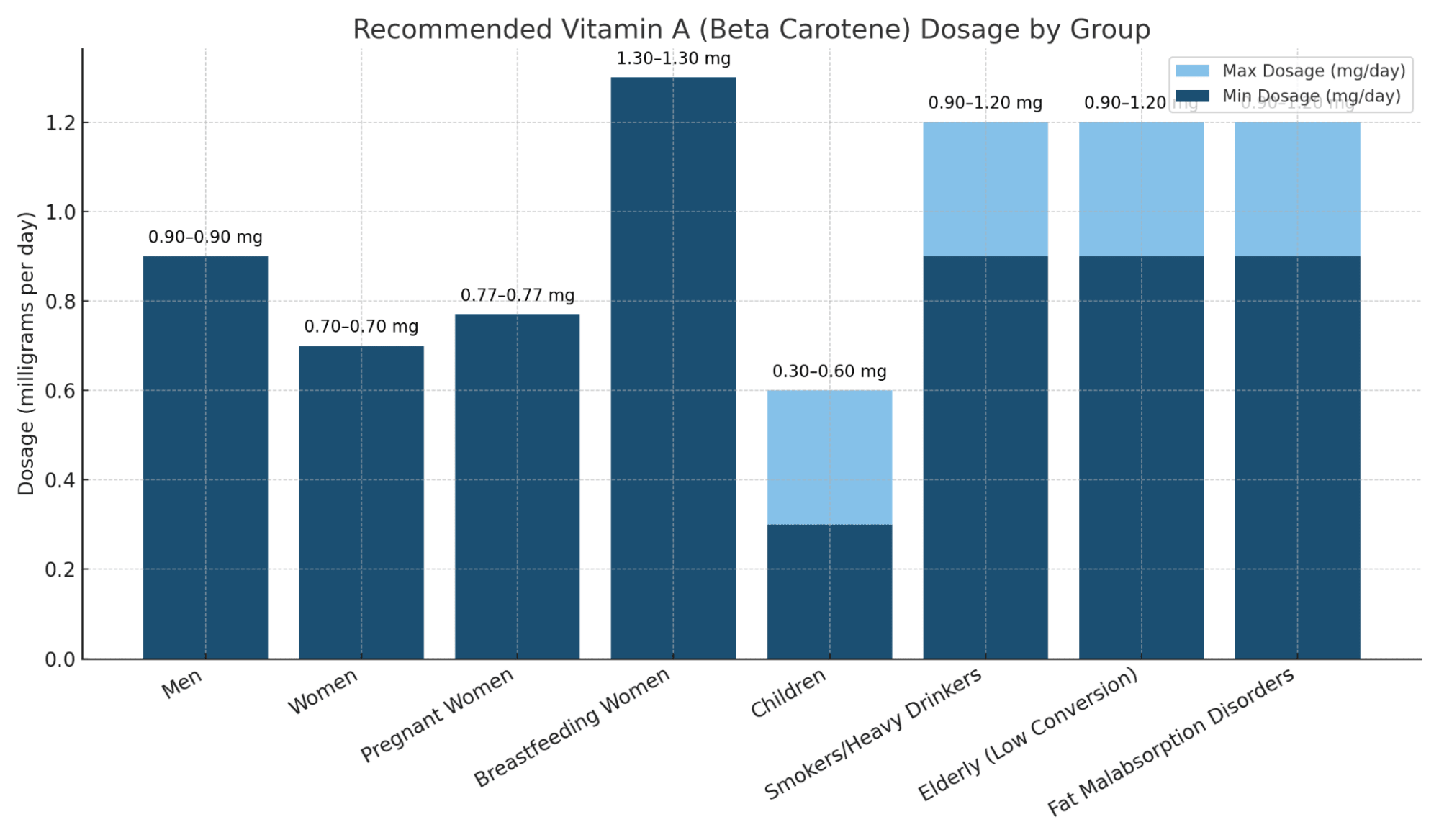
Vitamin A exists in two primary forms: preformed vitamin A (retinol) and provitamin A carotenoids, the most well-known of which is beta carotene. Beta carotene is a plant-based pigment that the body naturally converts into retinol, the active form of vitamin A. [1]
This conversion is self-regulated, meaning your body only converts what it needs. This makes beta carotene a safer, more balanced source of vitamin A compared to high doses of synthetic retinol, which can accumulate in the liver and cause toxicity.
Beta carotene gives many fruits and vegetables their vibrant orange, yellow, and green hues. Common dietary sources include:
In supplements, beta carotene is typically extracted from natural algae or plant sources. Its presence in whole foods makes it easy to obtain, but supplemental forms help ensure consistent and sufficient intake, especially when dietary habits fall short.
Once ingested, beta carotene converts to Active Vitamin A in the Body when:
This natural conversion process ensures better safety, balance, and efficiency in meeting the body's vitamin A needs.
Miduty takes a thoughtful, health-conscious approach by using plant-sourced beta carotene instead of synthetic or animal-derived retinol in its Eye Vision Shield, Smarty Kids, and Multivitamin supplements. This decision isn't just about clean labeling, it's about safety and smarter supplementation. Beta carotene is a provitamin A, meaning your body converts it into active vitamin A only as needed, which significantly reduces the risk of toxicity and overdosing associated with preformed vitamin A.
This makes it a gentler, balanced, and liver-friendly option, especially for long-term use. It's also completely vegan and vegetarian-safe, making it suitable for those with dietary restrictions or sensitivities. Unlike high-dose retinol supplements that can burden the liver, Miduty's beta carotene is better tolerated and paired with natural emulsifiers or healthy fats to enhance absorption and effectiveness without overwhelming the system.
Beyond safety, the benefits for eye health are significant: beta carotene is essential for night vision, helps prevent dryness, and supports moisture retention and visual clarity. For individuals seeking a natural and effective eye vitamin, particularly those struggling with blurry vision, Miduty's plant-based formulation delivers targeted support through a safe, science-backed alternative to traditional vitamin A supplements.
| Uses & Benefits | Description |
| Eye and Vision Support |
Vitamin A is essential for retinal health, particularly in supporting: [2]
Beta carotene is especially important for those at risk of macular degeneration or digital eye strain due to prolonged screen time. In the retina, vitamin A combines with a protein called opsin to form rhodopsin, a molecule that absorbs light making it critical for seeing in low-light conditions. It also helps reduce the progression of age-related macular degeneration (AMD), especially when combined with zinc and vitamins C and E. [3] |
| Skin and Cellular Regeneration |
Beta carotene and its vitamin A derivatives help:
It's a common ingredient in skincare supplements and anti-aging formulas, due to its ability to clear up acne, improve texture, and reduce pigmentation. Supplementing with beta carotene provides internal nourishment for the skin, offering protection from UV damage and supporting radiant, youthful appearance. [5] By combating oxidative damage, beta carotene helps:
Its antioxidant effects are also useful in detox programs, as it supports liver enzymes involved in breaking down toxins and flushing them from the system. |
| Wound Healing and Skin Health |
Beyond its immune-boosting potential, Echinacea Purpurea has also been used topically for its skin-healing properties. The extract helps stimulate fibroblast activity and collagen production, making it useful for: [6]
|
| Immune Defense and Mucosal Health |
Vitamin A is often called the “anti-infection vitamin” due to its role in:
Beta carotene helps maintain the first line of defense against bacteria and viruses by keeping epithelial tissues healthy, especially important in respiratory and digestive systems. Beta carotene’s influence on immune health is profound:
It's especially beneficial for individuals prone to seasonal allergies, respiratory congestion, or sinus issues. |
| Antioxidant and Detox Support |
As a potent antioxidant, beta carotene neutralizes free radicals that damage cells and accelerate aging. It helps: [8]
These antioxidant actions also play a role in reducing the risk of chronic diseases such as cancer, heart disease, and neurodegenerative conditions. |
| Improves Skin Tone and Repairs Damage |
From acne to aging, beta carotene’s skin-regenerating effects make it a staple in beauty nutrition. Benefits include:
Internally, it acts like a natural sunscreen, supporting skin from within. |

According to global health guidelines:
People with fat-malabsorption disorders (like Crohn's or celiac disease) often require supplemental vitamin A due to poor absorption from food.
Vitamin A (beta carotene) is a fat-soluble nutrient, meaning it requires dietary fat for optimal absorption. The best time to take it is:
Always take beta carotene:
Beta carotene is particularly valuable during:
For those focused on glowing skin or enhanced immunity, consistency is more important than timing so just be sure to take it daily with a nourishing meal.
One of the major advantages of beta carotene over preformed vitamin A (retinol) is safety. Your body converts only the amount needed to maintain optimal levels, meaning:
However, extremely high doses (over 20-30 mg/day) for long periods may cause carotenemia, a harmless yellowing of the skin, especially on palms or soles. It's cosmetic and reversible.
While beta carotene is generally safe, caution is advised for:
Always stick to natural, food-based, or low-dose supplemental forms, as found in balanced formulas like Miduty's.
Beta carotene works even better when combined with:
Together, they form a potent antioxidant complex that supports:
Beta carotene is ideal for:
It's one of the safest, most versatile nutrients in any wellness routine.
Here's how to get the most from beta carotene:
Whether you're improving skin tone, strengthening immunity, or preserving vision, Vitamin A from beta carotene is a foundational nutrient and Miduty makes it easy to access in its best form.
Beta-carotene is a powerful antioxidant that the body converts into vitamin A. It supports immune health, protects cells from free radical damage, promotes healthy vision, and helps maintain skin and mucous membrane integrity.
Beta-carotene helps protect the skin from oxidative stress and sun damage by neutralizing free radicals. It also supports collagen health, reduces signs of aging, and gives the skin a natural glow due to its provitamin A activity.
High doses of beta-carotene can cause carotenemia, a harmless yellow-orange discoloration of the skin. Excess supplementation may also increase lung cancer risk in smokers. For most people, moderate dietary intake is safe.
Beta-carotene does not directly increase melanin production. Instead, it provides a natural skin tint and helps protect against UV damage through its antioxidant action, giving the skin a healthier and slightly sun-kissed appearance.
Yes, beta-carotene is essential for eye health. Once converted to vitamin A, it supports the retina, prevents night blindness, and lowers the risk of age-related macular degeneration by protecting eye cells from oxidative stress.
